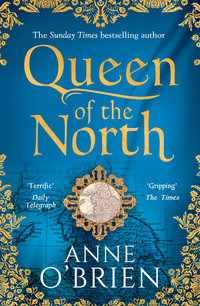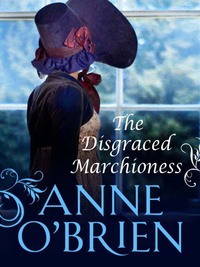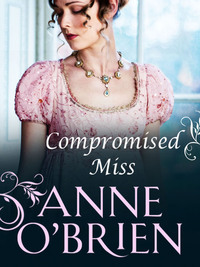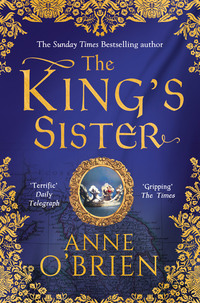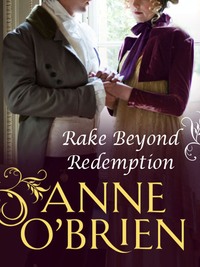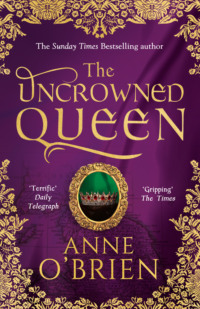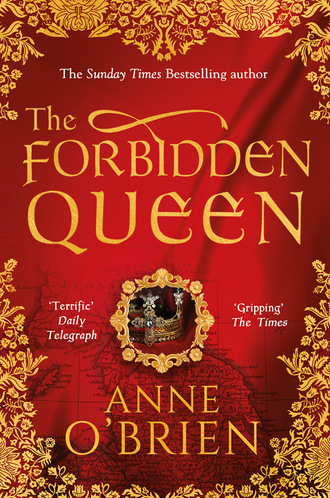
Полная версия
The Forbidden Queen
‘Yes. Go back and wait in the hall. I will come and take my leave of you shortly.’
Take my leave…!
‘But I wanted to—’
‘Not now.’ He drew in a breath. I knew it was to temper his impatience, but I would not be cowed. A strange boldness took hold of me, born out of panic that he was abandoning me.
‘I wish to know what is happening.’
He must have seen the turmoil in me, for his voice became infinitesimally less abrasive, the habitual veneer of courtesy restored to a degree. ‘You should not be here, my lady. I’ll come to you when I can.’ He caught Bedford’s attention with a lift of his hand. ‘John—escort my wife back to the hall.’
He was already snatching up a document from a squire who’d arrived with labouring breath and a covering of dust from head to foot. Tearing the seal, he scanned it, his mouth clamped like a steel trap as he read, entirely oblivious to me. I felt a flush of shame heat my cheeks, for I had been put in my place so thoroughly. It hurt me to know that he had grounds for his irritation. I should not have been there: a mustering army was no place for a woman on foot. I could hear Isabeau’s words ringing in my head. I had acted foolishly, without restraint. It was not becoming in a wife, in a queen.
Without waiting for Bedford’s escort, I made my way blindly. I must hold up my head. I must not show anyone interested enough to single me out that I felt slighted, humiliated, and, more importantly to my mind, I must not show that I was ignorant of this change of plan. Why had he not talked to me of this? Surely Henry could have told me, instead of leaving me to believe that the tournament would go ahead as planned? I swallowed hard against an unexpected threat of tears, as angry with myself as with Henry. I must learn to have more pride. I must learn to have composure.
In the hall, skirting the walls and thus keeping out of the way of the comings and goings, I turned into a window embrasure where I sat. Guille hovered.
‘You could return to your chamber, my lady. That might be best.’
But I would not. I would make my own decision, no matter how small, no matter how unused I was to doing so. And so I remained there, in all my useless, festive glory, as if carved from marble, my heart a solid lump of it. Cold and uncertain, all my earlier happiness no more than a faded memory, the one question that beat in my head, with the familiar flutter of painful anxiety was: why did he not tell me? This preparation for war had been no instant decision. He had known. He had known when I had confessed my naïve pleasure in the tournament. Why had he not told me the truth then, that the celebration would never take place?
Because he does not care enough about you to be honest with you. It was easier for him, so that he need not explain that he would leave you on the first day of your married life.
It was the only answer that made any sense. He did not care for me, for Katherine. Any wife with my blood and my name and my dowry would have sufficed. Why should he have to explain himself to me if he did not wish to? I mattered to him because, by a signature on a document, I had brought him a crown, and that was all.
And then I saw him approaching, followed by a squire and a brace of hounds. By the time he reached me his brow was smooth, but I had seen it, that first moment when he had looked around to discover me, and he had frowned.
‘What is happening?’ I asked as soon as he was within hearing distance.
‘I am leaving.’
‘Where are you going?’
‘To the fortress of Sens.’ He stood in front of me.
‘Why?’
‘I intend to invest it.’ I must have looked puzzled. ‘To set up a siege.’
‘Were we not to celebrate our marriage today?’ Restraint seemed to be beyond me.
‘There are more important things to do, Katherine. Sens is a hotbed of Dauphinist sympathies. It needs to be brought under English control.’
‘And it has to be today?’
‘I think it must.’
I did not think he understood the reason for my question at all. Why did you not tell me? The one question I dared not ask, for I already knew I would not like the reply.
‘And I think I should know what is expected of me today,’ I said instead. Despite the fist that seemed to have lodged permanently in my chest, I held his flat regard, astonished at my brazenness, but I would not be swept aside as an unwanted nuisance. I was his wife and I was a Valois princess. This day, by tradition, as he well knew, should have been mine, and the situation at Sens was hardly an emergency to demand Henry’s attention at this very hour. I kept my voice low and cool.
‘I was expecting to celebrate my marriage. Now it seems that I am not to do so. I think I should have been made aware of this. Last night you did not tell me. And you dismissed me from the courtyard as if I were an encumbrance.’
Don’t dare to tell me that the decision to go to war was made this morning.
As Henry inclined his head, the slash of high colour along his cheekbones began to fade. ‘It was obviously remiss of me,’ he replied stiffly. ‘I ask pardon, lady, if I have given offence.’
It was the nearest I would get to an apology—and I felt he did not make them often—but it was not a reason. I could feel his impatience to be elsewhere, to be involved and doing.
‘How long will you be gone?’
‘It’s a military campaign. It is impossible to say.’
I wished he did not make it quite so plain that he thought it was all beyond my understanding.
‘What about me?’ How hard it was to ask, but what was expected of me? How was I to know if I did not ask Henry? Did I sit at Troyes and wait for news? Stitch and pray as a good wife should, living out her days in fear that her lord was wounded or even dead. That was exactly what he would think. ‘I suppose you wish for me to remain here.’
‘No. You will accompany me.’
The rock in my chest lurched. ‘Accompany you? To Sens?’ The terrible constriction eased.
‘Certainly. You are my wife and between us we have a duty to perform. An heir for England and France. The misguided efforts of the Dauphin can not be allowed to hinder a political necessity.’ He bowed. ‘I’ll send instructions for your comfort during the journey.’
It was as if he had struck me and I flinched. So my compliance was nothing more than a political necessity, a need for me to prove my Valois fertility, and for him to discuss it so blatantly in the presence of his squire and my chambermaid…Because I could do no other, I swept my borrowed skirts in a formal curtsey.
‘I will be honoured to accompany you.’
Henry bowed. ‘That is good. Good day, my lady.’
And I was once more alone in my window embrasure, wretched with disappointment, watching him weave his way between soldiers and servants. I sank back onto the window seat.
What did you expect? He is at war. A war against your brother. Of course he will be preoccupied. Do you really expect him to pass the time of day with you?
My eyes followed his progress through the hall with, I suspected, a world of longing in their depths that I had not the skill to disguise. At the door, he looked back over his shoulder. Then he paused, gestured for his squire to go ahead, before striding all the way back through the crowd, which parted to let him pass.
I stood. Now what would he say to me? Perhaps he had changed his mind, considering that it would be better for me to remain in Troyes. The frown was still heavy on his brow, if that was any indication.
‘My lord?’
Henry stripped off his gauntlets, handed them to Guille and seized both my hands.
‘I have abandoned you—and I need to ask your pardon,’ he announced. ‘I was in the wrong. We will both have to accept that there will be times when I forget that I have a wife. I’ll not make excuses, Katherine, but sometimes for me the demands of war will be paramount. I would not have hurt you or made you feel of less worth than you are to me. I did not wish to distress you last night. You were so looking forward to today. There will be other tournaments, I promise you. And I sent you out of the courtyard for your own safety. Do you understand?’
He sighed and at last he smiled. ‘I suppose I have not used you well. Preoccupation or selfishness—call it what you will. I ask your pardon, my dear wife.’
‘I do understand. I willingly give it.’ His apology, the depth of sincerity in his words and expression, astonished me.
‘I want you with me in the coming weeks.’
‘And I want to be with you,’ I replied.
‘We will come to know each other better.’
Henry kissed me full on the lips then bowed, his hand on his heart. He would never know how far that gesture went towards healing my uncertainties. There was the explanation I had so desperately wanted from him, and the acknowledgement that I had been in the right to demand it. For my part I must accept that war was a demanding mistress on Henry’s time and concentration and, therefore, I, his wife, must learn to temper my needs.
The hurt of the morning began to lessen, giving way to a soft awareness of my new role in this marriage, and the knowledge that I must try hard to build this new relationship into something solid and valuable, as Henry would try too. He had not thought about me because he could not, but when we were together, every day, on honeymoon…
I took Henry’s gauntlets from Guille—Henry had forgotten to retrieve them—and smoothed the stitched and jewelled leather between my palms, before handing them to a passing page with orders to return them to their regal owner. Yes, we would come to know each other better. My spirits lifted.
The opportunity for me to prove my fertility to Henry’s satisfaction was no easy matter to accomplish, but I was granted a honeymoon of sorts. As an army wife, a camp follower.
My honeymoon read like a military campaign. Henry, as newly appointed Regent of France in my father’s name, and thus leading the attack against my brother Charles, took me with him, much like an item of military equipment. I was at the surrender of Sens—a rapid affair over a mere seven days—in June. Ensconced in a pavilion in his camp, Henry had no time for me, although he did inform me of his victory when the fortress fell. He did not even find the time to visit my bed with a view to procuring an heir. For me it was like living in a constant state of apprehension. Would Henry visit me? If not, was it because I had displeased him in some manner unknown to me?
I sat and stitched and tried to converse with my damsels, who made little effort to converse back. I was wary of them. Particularly of Lady Beatrice, the lively brunette, owner of the sharp tongue and a blue and gold damask houppelande with trailing sleeves. I returned the gown to her.
‘It is lovely. I thank you for your generosity, but you must have it back. I had no opportunity to wear it,’ I explained stiltedly.
Her curtsey was perfect, her smile knowing. They all knew of my missed opportunity.
And then we were all packed up and on to Montereau and Melun, where, to my astonished satisfaction, Henry, with an heir strongly in mind after his lengthy absence from the allure of my body, had a dwelling constructed for me, out of earshot of the cannon but near to his pavilion. Thus I was restored to Henry’s determined embrace.
Henry proved to be a driven man. His visits to my bed were now so regular that I felt as if I were written into the battle plans, along with the digging of trenches and the ordering up of ale to keep the soldiery content. He was brisk and efficient on those frequent forays into intimate relations over the four months it took to reduce Melun. He never stayed with me longer than an hour, but during that time I was granted his complete attention. He was always gentle with me. As recompense for his rapid departures, at sunrise and sunset he ordered English minstrels to play one hour of sweet music for me.
I enjoyed the music far more than I did the smoothly expert but rapid assaults on my body. They roused nothing in me other than a desire that I might quicken fast and be done with it. Regretting my coldness, I put the blame firmly at my own door but could do nothing to remedy it. The more I worried about my freezing reticence, the worse it became. To be fair to my new husband, he did not appear to notice. Perhaps he had not the opportunity in the short time he allowed himself to fulfil his marital duties. He was never critical of me. I was touched when he ordered two harps to be sent from England.
‘I know you play the harp,’ he said, snapping his fingers to alert my page, who promptly presented one of the magnificent instruments to me, on one knee.
‘I do.’ I admitted my surprise, and pleasure, that he had found time both to discover it, and to arrange for their delivery from England.
‘My brother John told me.’ Henry ran an expert thumb over the strings of the second harp. ‘I too have the skill.’ He smiled thinly at my raised brows. ‘I have other interests besides warfare, Katherine. Perhaps we might play together.’
I flushed with the thought, until disappointment set in. We might have achieved a meeting of souls in music if Henry had had time to run his hand even once across the strings but his hand was firmly on the war pulse. Music—and a wife—were both an irrelevance for most of the time.
And yet all was not uneasy isolation for me: I made one acquaintance due to the intensity of the savage fighting. I did not recognise the young man, some few years older than I, compactly built, with steady grey eyes at odds with the vibrantly curling hair that reached to his shoulders, who was brought to my door under what was clearly a military guard.
‘Lady Katherine.’ He bowed with the sweetest of smiles, his escort unexpectedly abandoning him to my care. ‘I apologise for my presence here. I am ordered to stay.’
‘Who are you?’ I asked. He clearly knew me.
He executed another flamboyant bow. ‘I am James Stewart.’
‘Yes?’
‘King of Scotland.’
‘Oh.’ I was no wiser. ‘Why are you here?’
‘I don’t suppose he’s told you, has he?’ I shook my head: ‘Because I am a prisoner of your husband.’
‘Are you?’
James explained with cheerful insouciance. Taken captive by English pirates on a ship bound from Scotland to France, he had been handed over to the English King and had been a captive ever since, too dangerous to be sent back to Scotland. And now, his nationality and title of an advantage to England, he had been escorted from London to the war front, where he had been instructed by Henry to command the obedience of the Scots mercenaries who were fighting for the Dauphin. To demand, as their King, that they lay down their arms.
‘Did it work?’ I asked, fascinated, imagining this lively individual addressing his wayward fellow countrymen on the opposite side.
‘Not that I could see. And why would they? Since they’re fighting for money, they don’t acknowledge my authority. Henry was not overly pleased.’ He did not seem particularly concerned over any royal displeasure, and I said as much. ‘I’ve been a prisoner of the English for fourteen years—since I was twelve years old,’ James explained. ‘I have to keep things in perspective, my lady.’
It made little sense to me, not understanding the situation between England and the Scots. ‘You are not well guarded,’ I pointed out. ‘Can you not escape?’
‘How would I get back to Scotland without English aid?’
‘Will you be a prisoner for ever?’ It seemed a terrible predicament. ‘Will Henry never release you?’
James Stewart shrugged lightly. ‘Who’s to say? Only on his terms.’
‘And what are they?’
‘I don’t know that yet.’
I admired the young man’s sangfroid.
‘Since we’re both here for the duration, can I be of any use to you, Lady Katherine?’ King James asked.
His grin won me over. ‘You can entertain me, sir. Tell me about England.’
‘You’ll not get an unbiased view. I’m the enemy and a prisoner, Lady Katherine.’
I liked him even more. ‘I’ll get more from you than I will from my damsels. And you must call me Katherine.’
‘Then you must call me James.’
And so I fell into the first friendship I had ever had.
‘Will I enjoy living in England?’ I asked, my anxieties multiplying now that the time was approaching. James had described for me the great palaces of Windsor and Westminster, the massive Tower of London, the places I would soon call home.
‘Why not? The English are kind enough. In a cool manner, and as long as they see some personal gain in engaging your support. They don’t like you as much as tolerate you.’
‘I think Henry only tolerates me.’ Shocked, I covered my mouth with my fingers. ‘I did not mean to say that. You must not repeat it.’ How unguarded I had been. How unwise to say what was in my heart. I looked at James anxiously. Would he think me impossibly unpolished?
But James returned my regard, suddenly very serious. ‘He will do more than tolerate you. He will fall in love with you—when he gets the battles out of his system. I would love you if you were my wife.’
My face flushed brightly, my breath caught in my throat.
‘Really?’ I knew I was ingenuous, but how could I not respond to such unexpected admiration? ‘How kind you are.’
I smiled at James, and he smiled back at me. From that moment he became a welcome addition to my battlefield household, which was further enhanced by the arrival of Dame Alice Botillier, her husband and full-grown son both being in Henry’s service.
Her role became something between nurse and superior tirewoman, her position arranged by Henry to promote my well-being and to care for me when I became pregnant. Stern and acerbic, every inch of her tall figure encased in austere black with a crisp white coif as if she had taken holy vows, I found her presence agreeable, although her first words were caustic enough.
‘There’s not enough flesh on your bones, my lady, to feed a starving lion. If you are to carry a child, we must build you up.’
‘If I am to carry a child, I need to see more of my husband,’ I replied crossly. Henry had been absent for almost a week.
Alice pursed her lips. ‘I expect he does his best in the circumstances.’
Her reply warned me that I must take care never to be openly critical of my heroic husband. The loyalty of the English to their masterful king was chiselled in granite, like the blank-eyed statues on Westminster Abbey. Accepting my silence as compliance, Alice dosed me with an infusion of feverfew, the yellow-centred white flowers gathered from the hedgerows.
‘If the King is to plant his seed, the earth must be rich and strong to nurture it.’
I shuddered at the rank smell.
‘Drink up! This will heat your belly and your blood. You’ll carry a child in no time.’
At a lull in the siege operations, Henry planted his seed with thorough attention to detail. I prayed fervently for a satisfactory result.
‘Are you happy here?’ Henry asked as he pulled on his boots and reached across the bed to retrieve his sword. There had not been much in the way of undressing, time being at a premium.
Happy? I did not think I was, but neither was I unhappy. Lonely, yes, but less so in the company of the splendidly garrulous Scottish King. My facility with English was improving in leaps and bounds, as James would say.
‘I am not unhappy,’ I offered, regretting my nervousness, wishing that I could be more loquacious in my stern husband’s company.
‘Good. I would not wish that.’
It had the effect of a warm caress, and encouraged by it I touched his wrist. Henry stroked his hand along the length of my hair.
‘A child will bring you happiness,’ he observed. And then: ‘You’re not afraid of me, are you?’
‘Afraid?’ My cheeks became a puzzled pink.
‘I have never yet beaten a wife.’
His humour was heavy but I laughed and reached up to kiss his cheek. Henry appeared surprised. His mouth was firm, his embrace strong and, abandoning the sword and any thought of returning to the fray quite yet, his renewed possession of me was more than flattering.
‘Pray for a son, Katherine. Pray for an heir for England.’
And I did, fervently. And that Henry would miraculously fall in love with me if I could laugh with him and fulfil this apex of his desire. While I was thus engaged in bright thoughts of the future, Melun fell at last. Rejoicing, I tolerated Alice’s astringent draughts, dressed with care, and was unpacking the harps when Henry arrived.
‘We leave tomorrow,’ he announced.
‘Where are we going? To England?’
Mentally repacking the harps, I experienced a sudden desire to see my new country. To settle into a new home where I might raise my children and have some time for what could pass for a normal wedded life even if I was a queen. Henry was preoccupied, reading a letter just delivered.
‘Do we go to England?’ I persisted.
‘Paris first,’ he said. His eyes gleamed. He must have seen my doleful expression for, surprising me, he wound an arm around my waist and drew me close, rubbing his face against my hair. ‘You will enjoy going home to Paris. We’ll celebrate our victory, and put on a show for the citizens.’ He kissed my mouth with obvious passion, perhaps for me as well as for his victory. ‘And then we will return to England. To celebrate our triumph. Perhaps we’ll have a child to celebrate too.’
It was lightly said, but I could feel the beat of his blood under my palm, and I felt a blossoming of incipient joy within me. Of anticipation for a love that would surely mature and develop between us. This would be the real beginning of my marriage, when we were in England, when we would be able to spend time together, to grow to know each other.
I laughed, making Henry smile too.
‘I would like very much to go to England. I’m sure I will quicken soon.’
CHAPTER FOUR
London, England: February 1421.
‘I don’t want that tradition, my lord. I would like you to stand with me.’
‘There is no need to be emotional, Katherine.’
Our first disagreement on English soil. Our first full-scale quarrel because, instead of my habitual, careful dissimulation, I said the first words that came into my head.
‘What do you wear for this occasion?’ I had asked, surprised at the informality of Henry’s tunic and hose when I was clad from head to foot in leopards, fleur-de-lys and ermine. I stood before him, arms lifted to display my finery, as he broke his fast with a hearty appetite in our private chamber. It had taken an hour for my damsels—Beatrice, Meg, Cecily and Joan—to dress me. Now Henry and I were alone.
‘Do you not have a part to play in this?’
‘No.’ Henry looked up from a platter of venison, knife poised. ‘I won’t be there.’
‘Why not?’
‘It is your day. I’ll not take the honour from you.’
I tensed against a tremor of anxiety. I would have to face this shattering ordeal on my own. Already I felt perspiration on my brow and along my spine beneath the heavy fur. Would I ever be able to face such public display with the equanimity that Henry displayed? I did not think so.
‘If I asked you to come with me,’ I tried, ‘would you?’
Henry shook his head. ‘It is the tradition. A King does not attend his Queen’s coronation.’
‘But I don’t want that tradition, my lord. I would like you to stand with me.’
I heard the quiver in my voice, flinched at the formality I still clung to in moments of fear, as I envisaged the hours of ceremonial that I would have to face alone. So did Henry hear it.
‘There is no need to be emotional, Katherine.’
‘I am emotional.’
I felt as if I was being been abandoned in a cold and friendless place, a lamb to the slaughter. I had left the country of my birth with my sister’s ring, a portrait of Henry given to me by Lord John and a desire in my heart to prove myself worthy of my husband’s regard. At first I had looked to Henry, but he had his own affairs and his own manner of dealing with them.





